Iranian Actor Arrested For Criticizing 'Morality' Police
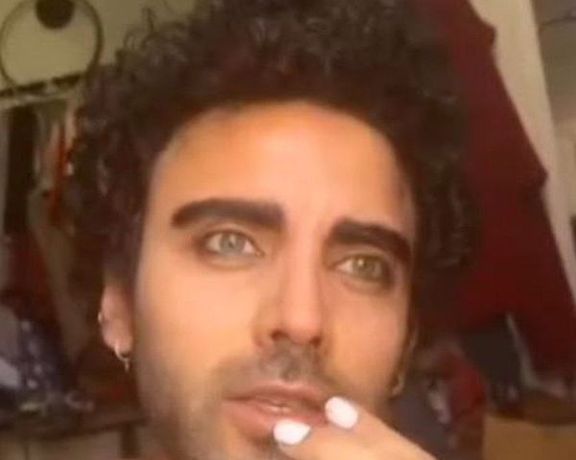
The police in Tehran arrested Mohammed Sadeghi, a young actor, during a raid on his home in an effort to clamp down on the anti-hijab movement.

The police in Tehran arrested Mohammed Sadeghi, a young actor, during a raid on his home in an effort to clamp down on the anti-hijab movement.
Sadeghi posted a video on Instagram expressing his anger over the detention of yet another woman in morality police hands due to her inappropriate hijab.
“Believe me, if I saw such a scene, I might commit murder,” he wrote in the caption of his video. "Why do you get paid? To take people's daughters into a van and arrest them?"
Regime agents rushed to Sadeghi's house in Tehran in the wake of the post, when he jumped from the third floor in a bid to escape. A dramatic chase ensued, which he filmed and streamed live to Instagram, in spite of the regime's attempts to ban the app.
In a new campaign to enforce mandatory hijab, morality police have now returned to the streets in full force after a brief few months' respite following the worst of the unrest which erupted in September after the death of Mahsa Amini in morality police custody.
Women continue to defy the official dress code, particularly in Tehran, despite the crackdown, with huge numbers seen across the country's public spaces from malls to universities with their hair uncovered as they flout the mandatory hijab rules.
Experts fear the renewed zeal of the morality police risks reigniting tensions.

A famous victim of Iran's hijab rules, Sepideh Rashno has published details of how she was assaulted by several agents in her apartment last July, that electrified public opinion before the death of now famous Mahsa Amini.
In a post on Instagram, she dramatically explained the events after an acrimonious dispute with a hijab enforcer in a city bus on July 16.
A video of her quarrel with the hijab enforcer on social media went viral last year leading to her arrest by the regime forces.
“I was afraid and went to the balcony to scream and ask for help, but a number of regime agents threatened me not to scream, otherwise they would come up and break my neck!” read her post.
Rashno further added that over ten agents searched everywhere, and one was filming the procedure.
The 28-year-old artist and writer was tortured last year into denouncing herself and other activists, expressing regrets for her confrontation with the hijab enforcer.
Her ‘forced confessions’ was also aired on state-run television after she was brutally beaten before the telecast. Her suffering left a deep mark on many people and prepared the stage for large anti-government protests later in September when Mahsa Amini was killed in hijab police custody.
Rashno was found guilty of “association and collusion with the intention of committing a crime against the country's security" and “propaganda against the Islamic Republic” and given a five-year suspended jail sentence in December.
In May, she revealed on her Instagram account that she has been punished by her university with two semesters suspension.
"As a citizen, I have the right to choose the clothes I wear,” she wrote in response to the decision, adding that she plans to return to the university after her suspension with “her preferred outfit.”
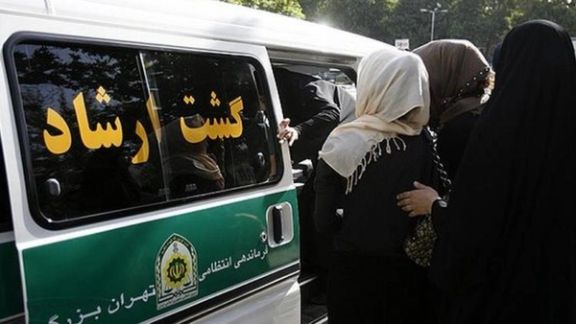
The ‘morality’ police in Iran have returned to the streets of Tehran and other cities ahead of the first anniversary of Mahsa Amini's death in police custody.
A video which went viral on Saturday shows Tehran's morality police arresting a teenage girl without compulsory hijab in Gisha neighborhood in the west.
The girl was screaming “I’m not coming with you” as the morality police try to push her into their unmarked van.
People on social media have reacted to the incident saying if Iranians do not pour into the streets on the death anniversary of Mahsa Amini in mid-September, the regime will tighten the noose.
Amini received fatal head injuries immediately after being arrested in Tehran for “improper hijab” and died three days later in hospital. Her death triggered months of anti-regime protests, which represented the most serious challenge to the clerical regime in 44 years.
Famous opposition figure and women's rights activist Masih Alinejad tweeted that this is how the morality police arrested a teenager for not wearing hijab.
“Mahsa Amini was taken away like this, then killed. Where are those journalists who excitedly reported the cancellation of the morality police?”
She was referring to a controversial report by the New York Times last December that said Iran has abolished the morality police. In response, Iranian activists accused western media outlets of disseminating misleading information on behalf of the Iranian regime.
“This is the grim reality Iranian women are subjected to living under the Islamic Regime. Nothing about this is normal. The only solution is regime change,” reads a tweet.
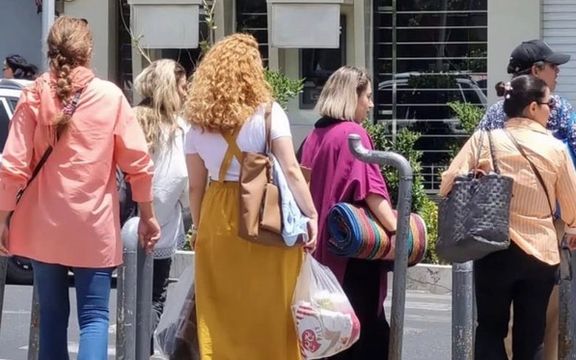
A woman should wash corpses for burial and an actress must attend counseling “to cure her anti-social personality disorder” for flouting the hijab.
These are just some of the weird decisions by religious courts in Iran handed down to women who in sizzling summer heat do not cover their upper body and head by a large shroud.
Iranian media and rights groups have reported that a woman was sentenced by a court in Varamin, a town south of the capital Tehran, to performing the ritual washing of corpses at a Tehran funeral establishment for one month in addition to a cash fine of 31m rials ($60) for not wearing the hijab in her car while driving.
Disregarding forced hijab has become common in large Iranian cities after last year’s popular protests that started when a young woman died in hijab police custody.
Another court in Tehran sentenced a woman to 270 hours of cleaning at the buildings of the interior ministry. Both sentences were a reprieve from two-month prison sentences.
“Are you not ashamed of the respectable and hardworking workers of Behesht-e Zahra funeral house for choosing their respectable profession as a punishment [for women] for not wearing your compulsory uniform?” documentary maker Mojgan Ilanlu asked the court in an Instagram post Friday.
The court ruled that the woman’s defense saying her headscarf may have fallen on her shoulders unintentionally was not acceptable.
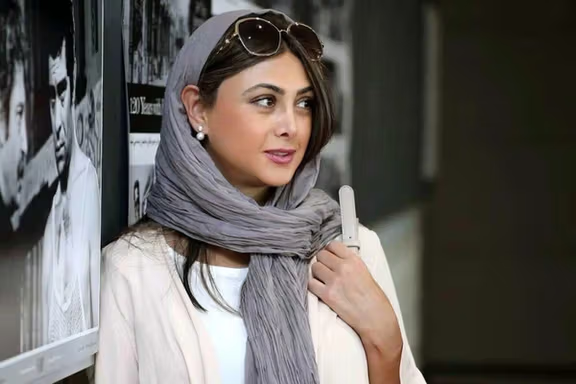
The news about actress Azadeh Samadi being sentenced to counseling sessions at “an official counseling center to cure her anti-social personality disorder” have also gone viral on social media since Friday. The court has also decided that Samadi cannot use her phone for six months and all her social media accounts would be “confiscated”.
A different court in Tehran last week sentenced another woman for defiance of hijab to two months of prison, six months of treatment for what the court called “contagious psychological disorder that causes sexual promiscuity” and a ban on traveling abroad.
Chicago-based law expert Pegah Bani-Hashemi told Iran International that judges are not entitled to sit in the place of psychologists and make diagnoses, such as “anti-social personality”, in cases where the defendant has not abided by hijab rules.
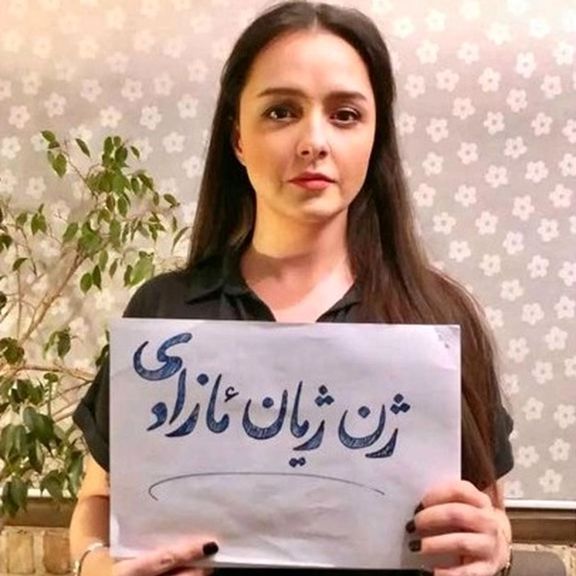
Defying the compulsory hijab, Samadi attended the funeral of a colleague wearing a hat instead of a headscarf. Actress Taraneh Alidoosti in a Twitter post criticized the authorities for convicting her colleague because in many Iranian government approved films actresses appeared wearing hats, when playing roles about the pre-1979 era when hijab was not so common.
Directors Guild of Iran and the Iran Producers Guild in a joint statement Saturday condemned Samadi’s sentencing and called it “an insult to the intelligence of all cinema people”.
In their statement, the two influential unions said they would stand by Iranian actresses and filmmakers whom the authorities try to humiliate with similar court decisions. They also demanded an apology to Samadi for the verdict which they called “weird”.
In June, Iran’s government film watchdog warned producers that if they give roles to actresses who have removed their hijab in public, their films could be banned.
Some other celebrities including Taraneh Alidoosti, and Katayoun Riahi were arrested or came under various types of pressures including foreign travel ban during the anti-government protests.
Riahi, 61, was the first among Iranian female artists to express her solidarity with the Mahsa Movement by sharing her photo without a veil on Instagram. “Iranian women are each other’s voices,” she said in her post. She was put on trial in January for supporting the protests.

A US senator hailed legislation passed by the Senate Foreign Relations Committee to support action against Iran's killing of protesters and systematic persecution of women.
Senator Jim Risch (R-Idaho) said Friday that last year's nationwide unrest showed the depth of the people's desire to live free of the “oppressive mullahs”.
“This resolution recognizes their efforts and encourages the administration to do more to end the regime’s systemic persecution of women and state-sponsored murder of Iranian citizens, and to hold human rights violators in Iran accountable. Supporting the aspirations of the Iranian people must be a key pillar of our Iran policy.”
In January, a bipartisan resolution was introduced in the Senate reaffirming US support for Iranian citizens who took to the streets in peaceful protest and condemning Iranian security forces' human rights violations.
“In the wake of the death of Mahsa Amini, the Iranian people have bravely protested the regime’s brutality and demonstrated their desire for a more peaceful and free Iran,” said Risch in January. “The Biden Administration should step up efforts on helping to end the regime’s systematic persecution of women and holding human rights violators in Iran to account.”
In addition to calling on the international community to continue to publicize and condemn the Iranian regime’s crackdown since protests began, the resolution called for the Biden Administration to strengthen international efforts to impose additional sanctions on officials and entities responsible for the violent suppression of demonstrations.
The resolution also emphasized the importance of the US government and the private sector providing additional support for access to digital communications and internet freedom in Iran.
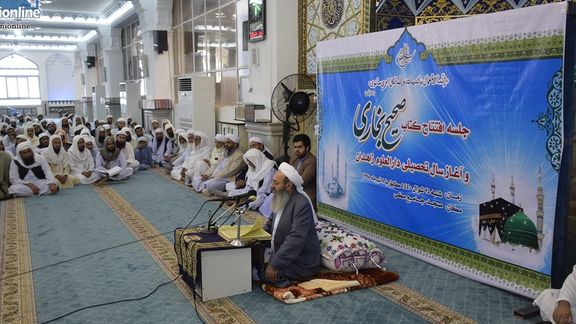
The office of top Sunni cleric Mowlavi Abdolhamid has refuted government allegations that many of the students and teachers of his seminary are in Iran illegally.
“The state media claims that some of the teachers and students of Zahedan Dar ol-Olum [also known as Maki Seminary] have forged their identity documents is absolutely false,” Abdolhamid’s office said in a statement published on his official website Thursday, following a recent mass expulsion.
The state-run television (IRIB) reported Wednesday that authorities arrested 132 preachers who were “foreign nationals” and aired brief interviews with three Afghan men, presumably from among the preachers sent back home, who said they had forged identity documents and entered Iran illegally.
The statement from the Sunni cleric came a day after the Revolutionary Guards (IRGC) linked Tasnim news agency claimed that fifty percent of the students and some of the teachers of Maki Seminary are “foreign nationals” who are illegally residing in the southeastern Sistan and Baluchestan Province.

The expulsion of seminary students was part of government pressure tactics against Abdolhamid who has been a consistent critic of the Shiite clerical regime since 90 protesters were gunned down by security forces in Zahedan on September 30, 2022.
Abdolhamid’s office said the Afghans sent back to Afghanistan were forced to make false statements about forging identity documents and illegal residence in Iran, threatening to reveal details of security forces’ intimidation.
In an attempt to conceal the mass expulsion, Tasnim claimed that a considerable number of seminary teachers and directors with illegal identity documents and forged identities were spared harsh prison sentences and instead sent back to their home country, attributing the reprieve to “Islamic compassion”.
The outspoken, moderate cleric who has become the unofficial voice of the country’s Sunni population - which is roughly 10 percent of the 88 million population - has come under constant pressure from the authorities recently to stop his fiery Friday sermons.
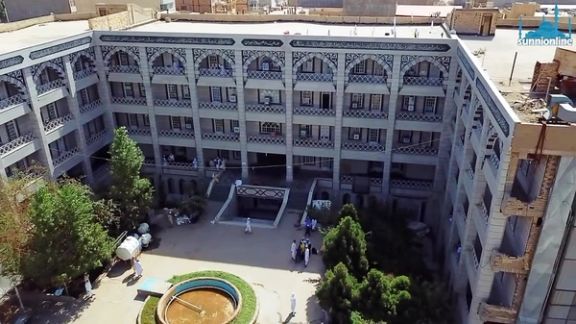
Abdolhamid has criticized the government for funding and controlling religious seminaries and taking away their independence. Iran's government annually allocates hundreds of millions of dollars to Shia religious seminaries and other religious institutions that play the role of its propaganda arm.
Abdolhamid’s call for a referendum with the presence of international observers to decide the future form of government in Iran has massively angered hardliners. He has expressed more liberal views about the role of women in the society after being criticized by some Baluchi activists for not mentioning women and acknowledging equality of men and women in his controversial Friday prayer sermons.
Iranian authorities often refer to citizens of Afghanistan, millions of whom live in Iran as refugees or economic migrants, as “foreign nationals”.
In April 2022, Foreign Minister Hossein Amir-Abdollahian said one million more Afghans had entered Iran since the Taliban took power in August the previous year, bringing the number of refugees and economic migrant to five million.
According to the UN Refugee Agency (UNHCR), only 780,000 of Afghans residing in Iran are recognized as refugees. Most other Afghans are considered economic migrants who have been an important workforce in Iran.